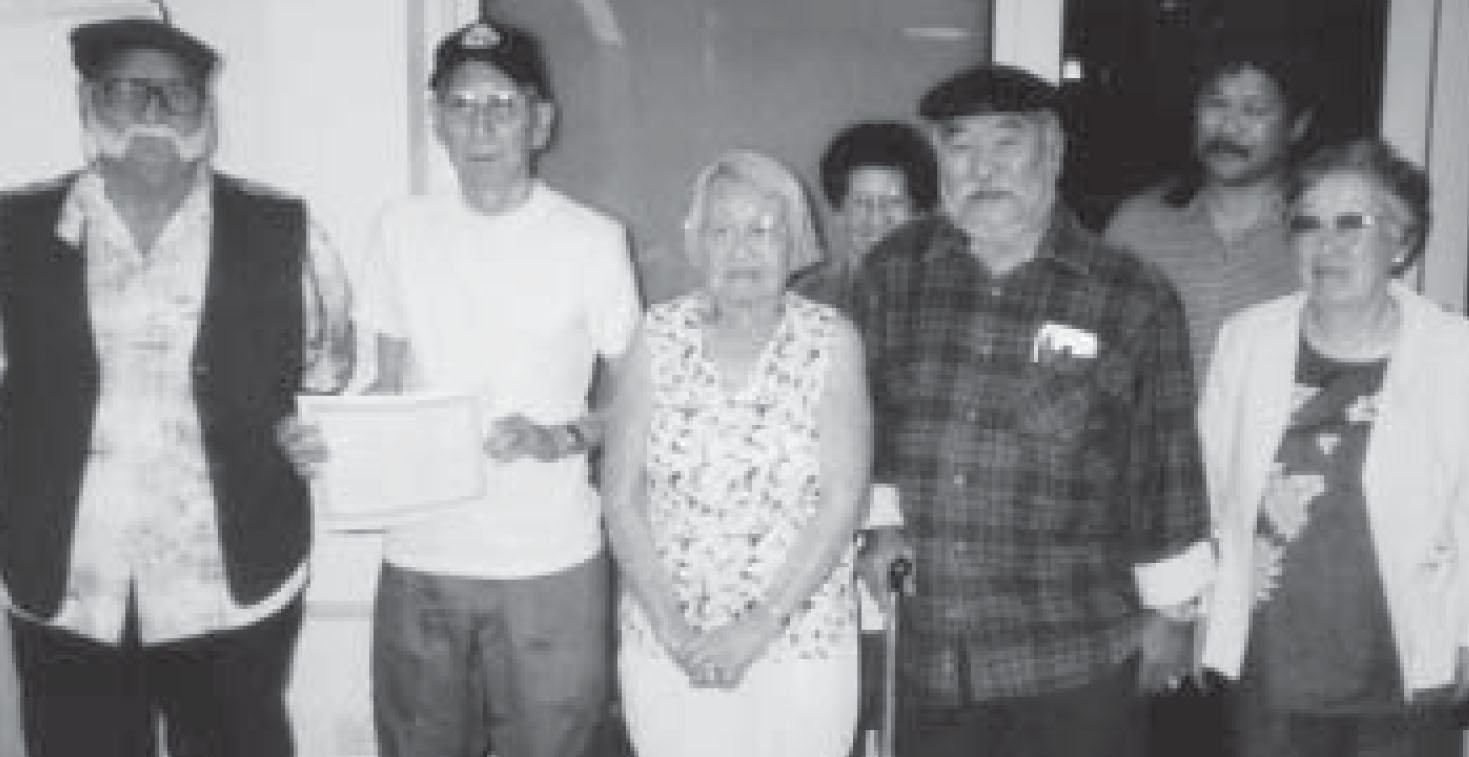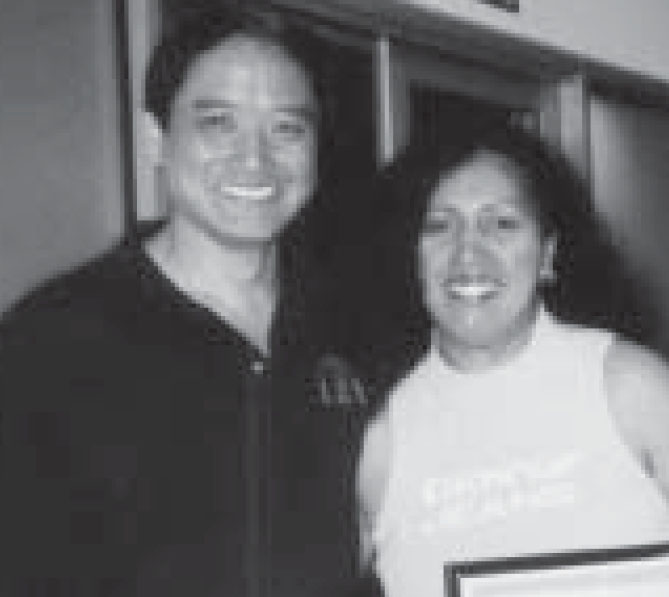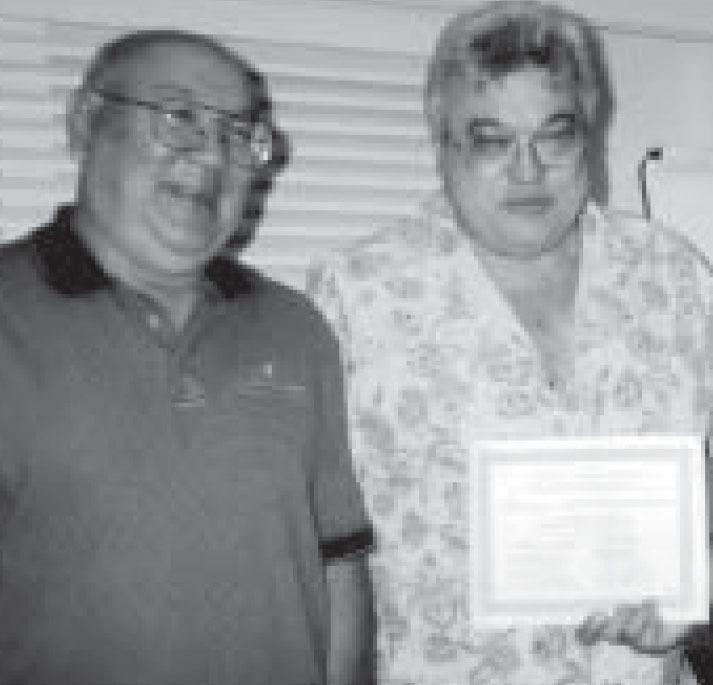HONOLULU—Oahu Division held its annual unit recognition awards night on February 21, 2003 after its Division Executive Board (DEB) meeting. The DEB meeting was the first held in the newly renovated ILWU union hall at 451 Atkinson Drive.
According to Division Director Raymond Camacho, the awards are a way of “recognizing the volunteerism of units and members that is so vital to the union’s success.”
Community Service awards were presented to two members from Unit 4409 - Island Movers, Inc.—Jeffrey Rapoza and Eddie Sekigawa—who volunteered as drivers for the Hawaii Foodbank. “Drivers are the people that you don’t always notice, but
they’re there working hard until late at night,” said Business Agent (BA) James Kahalewai, who presented the awards.
2002’s Stewards of the Year— Abeleen Lau of Unit 4415 - Diamond Head/Nuuanu Memorial Park and Lance Kamada of Unit 4406 - The Honolulu Advertiser—were highly praised by their Business Agents. “We really counted on Abe’s participation in political action,” said BA Larry Ruiz. BA Dave Mori said of Kamada: “We all contribute in our own way, but there are certain
individuals who are the ‘go to’ people, and we can depend on them no matter what.”
The Most Inspirational award went to Unit 4403 - Hawaii Baking Co., which had gone through many hardships and changes in 2002. Long-time members Charles Sham and Betram Yasui accepted the award on behalf of their unit from BA Karl Lindo. “The members have had a difficult time over the past year but stuck it out and fought to protect themselves,” said Lindo. Unit
treasurer Sham spoke passionately before the DEB. “The situation with Hawaii Baking underlines why it is important to have a union and to be involved in political action. If you don’t have a union, you don’t have a snowball’s chance in hell. Remind
your members—without this union we wouldn’t have a voice.”
The Most Valuable Pensioner award for 2002 was given to a core group of pensioners who were instrumental in getting ILWU
political action information to union members. They worked tirelessly at phonebanking, stuffing envelopes and other activities.
Unit Leaders of the Year were Sharon Basmayor of Unit 4404 - Pepsi Bottling Group and George Cox of Unit 4409 - Island Movers, Inc. “If and when the day comes that Sharon is no longer there, her shoes will be hard to fill and my job will be
tougher,” said Mori. Kahalewai added of Cox, “George embodies the aloha spirit for us. What he does for his unit, he does from the heart.”
Unit awards
Unit 4415 - Diamond Head/ Nuuanu Memorial Park won the award for Outstanding Unit with 1- 25 Members. The unit benefits from highly motivated rank-and-file leadership who work out problems on the job and volunteer for Division
activities whenever needed.
Unit 4409 - Island Movers, Inc. received recognition as the Outstanding Unit with 26-99 Members. Because they work at a
growing company, union leaders are constantly educating new employees about the benefits of union membership.
Unit 4524 - Honolulu Airport Hotel received the Outstanding Unit with 100+ Members award. Members there took a difficult situation—no raise since 1996, foreclosure, a change in management, and lack of management—and turned it around. They now have a strong contract with no subcontracting, as well as significantly improved successorship language.
This year’s Outstanding Editors were Dorothy Sakamoto from Unit 4301 - Dole Fresh Fruit Co., who received the David E. Thompson Award for Statewide Excellence, and Gordon Young and Mike Yamaguchi from Unit 4406 - The Honolulu Advertiser, who took first place honors on Oahu.

Accepting an award on behalf of pensioners who helped with ILWU political action are Bob Frietas, Eddie and Dorothy Chang, Esther Scharsch, George Dantsuka, BA Larry Ruiz, and Haruye Ichiki.


(Above) Oahu “Stewards of the Year” Lance Kamada and Abeleen Lau. (Right) Bertram Yasui and Charles
Sham of Unit 4403 - Hawaii Baking Co. accept the “Most Inspirational” award on behalf of their members.

Unit 4409 - Island Movers, Inc. won three awards: Outstanding Unit 26-99 members, Male Unit Leader of the Year (George Cox), and Community Service awards to Eddie Sekigawa and Jeffrey Rapoza (above).

Female Unit Leader of the Year Sharon Basmayor of Unit 4404 - Pepsi Bottling Group.
SARS: General guidelines for all workers
The Centers for Disease Control and Prevention (CDC) is investigating the spread of a respiratory illness called severe acute respiratory syndrome (SARS). Because the outbreak has initially affected international travelers who have recently visited mainland China; Hong Kong; Singapore; and Hanoi, Vietnam, CDC issued a travel advisory for people traveling to those
areas. You can learn more about SARS from the World Health Organization at http://www.cdc.gov/ncidod/sars/links.htm#who.
SARS is an infectious illness that appears to spread primarily by close person-to-person contact, such as in situations in which persons have cared for, lived with, or had direct contact with respiratory secretions and/or body fluids of a person known to be a suspect SARS case. Potential ways in which infections can be transmitted by close contact include touching the skin of other persons or objects that become contaminated with infectious droplets and then touching your eyes, nose or mouth.
Workers, who in the last 10 days have traveled to a known SARS area, or have had close contact with a coworker or family member with suspected or probable SARS could be at increased risk of developing SARS and should be vigilant for the development of fever (greater than 100.4° F) or respiratory symptoms (e.g., cough or difficulty breathing). If these symptoms develop you should not go to work, school, or other public areas but should seek evaluation by a health-care provider and practice infection control precautions recommended for the home or residential setting; be sure to contact your health-care provider beforehand to let them know you may have been exposed to SARS.
As with other infectious illnesses, one of the most important and appropriate preventive practices is careful and frequent hand hygiene. Cleaning your hands often usingeither soap and water or waterless alcohol-based hand sanitizers removes potentially infectious materials from your skin and helps prevent disease transmission.
The routine use of personal protective equipment such as respirators, gloves, or, using surgical masks for protection against SARS exposure is currently not recommended in the general workplace outside the health-care setting.
